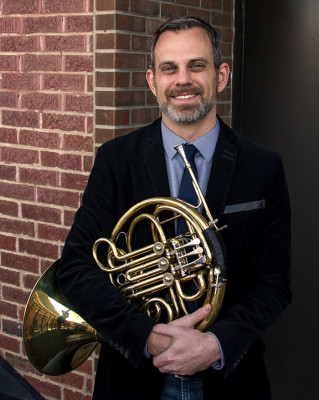Studio Overview
The CSU Horn Studio philosophy is simple: Through the horn, we strive to develop the very best musicians, whether their career goals involve playing in a high level professional orchestra or military band, teaching at any level (elementary music through collegiate level teaching) as a private applied horn teacher or as a music educator, as a music therapist, or as a music administrator. We witness on an almost daily basis the fact that the high level, intensive study of music, specifically on the horn, aids the student in all measurable ways in the pursuit of one’s life passions.
Here at CSU, we value individuals of impeccable character who are not afraid of persistent, dedicated, and diligent practice. At the end of the day, every professional knows that there are countless people that can be chosen for a job. Frequently, what matters most to a long term employer is that the individual that is chosen is of good character and can be counted on the do what needs to be done, when it needs to be done, whether they want to do it or not. We strive every day to create not just horn players or musicians, but leaders in the rapidly changing world of music.
Each and every student has somewhat different professional goals and comes in at a somewhat different level than any other horn student. By the completion of a music degree at CSU, the individual should expect to have realized some of their true potential musically and to have the tools to be able to continue their progress after they leave here.
The CSU Horn Studio has grown in recent years, in quantity but more importantly in quality. Our recent graduates have gone on to careers as music educators, therapists, and professional performers, including positions in orchestras around the world. Progress as a horn player at CSU involves a significant commitment to the craft of horn playing and the art of music making. This means a lot of time in the practice room (obviously!), but also means stepping out of the confines of the UCA and experiencing what the real world of music has to offer.
In order to better facilitate the growing needs of our talented young artists, Dr. McGuire has overseen an expansion of the reach of the CSU Horn Studio. The CSU Horn Studio frequently participates in regional and national workshops and competes in several international horn solo competitions. In addition to this, we have welcomed well-known artists to our campus, hornists like Johanna Yarbrough (Fourth Horn, Detroit Symphony Orchestra), Charles Snead (former Principal Horn, Jacksonville Symphony Orchestra), Jeff Nelsen (former hornist with the Canadian Brass), and Martin Hackleman (former Principal Horn of the National Symphony Orchestra and hornist with the Canadian Brass and Empire Brass).
By bringing in such artists in addition to branching out on an international level, the CSU Horn Studio hopes to continue the growth and development of our emerging young artists and build on our proud recent tradition of excellence.
Audition Requirements
Undergraduate Requirements (all degrees)
Required Solo Work (accompaniment optional)
- All candidates for admission must perform the first movement or rondo of a Mozart Concerto for Horn (K.412, K.417, K.447, or K.495). The Mozart Concert Rondo (K.371) or Mozart Horn Quintet (K.407) are also acceptable works.
Solo Work of Choice (accompaniment optional)
- A solo movement of the candidate’s choice. This repertoire may include (but is not limited to):
- Beethoven, Sonata, Op. 17
- Bozza, En Foret
- Dukas, Villanelle
- Saint-Saens, Morceau de Concert
- Strauss, Franz, Concerto Op. 8
- Strauss, Richard, Concerto No. 1 or 2
Orchestral Excerpts (OPTIONAL)
- Please choose any three (3) excerpts from the following list:
- Beethoven, Symphony No. 6, mvmt. III (horn 1)
- Brahms, Symphony No. 3, mvmt. III (horn 1)
- Mahler, Symphony No. 1, mvmt. III (horn 2)
- Shostakovich, Symphony No. 5, mvmt. I low tutti (horn 1)
- Strauss, Till Euilenspiegel, opening call (horn 1)
- Tchaikovsky, Symphony No. 4, mvmt. I opening (horn 1 and/or 2)
- Tchaikovsky, Symphony No. 5, mvmt. II (horn 1)
- Wagner, Gotterdammerung, Siegfried’s Rhine Journey Short Call (horn 1)
Graduate Requirements
- All major and minor scales
- Sight reading
- At least 2 of the following:
- Richard Strauss Concerto No. 1 or 2 (or similar level solo work)
- Mozart Concerto No. 2 or 4
- Twentieth or Twenty-first century work of applicant’s choice
- 5-8 standard orchestral excerpts (high and/or low)
Should you have any questions about the music listed, or comparable music, please do not hesitate to contact Dr. John McGuire at John.McGuire@colostate.edu.


